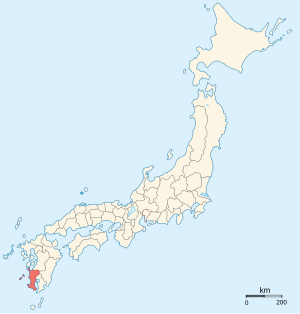Satsuma Province
| Satsuma Province | |||||||||
|---|---|---|---|---|---|---|---|---|---|
| Province of Japan | |||||||||
| 7th century–1871 | |||||||||
 Map of Japanese provinces (1868) with Satsuma Province highlighted | |||||||||
| Capital | Satsuma District | ||||||||
| History | |||||||||
• Established | 7th century | ||||||||
• Disestablished | 1871 | ||||||||
| |||||||||
| Today part of | Kagoshima Prefecture | ||||||||
Satsuma Province (
History
[edit]
Satsuma's provincial capital was Satsumasendai. During the Sengoku period, Satsuma was a fief of the Shimazu daimyō, who ruled much of southern Kyūshū from their castle at Kagoshima city. They were the initial patrons of Satsuma ware, which was later widely exported to the West.
In 1871, with the abolition of feudal domains and the establishment of prefectures after the Meiji Restoration, the provinces of Satsuma and Ōsumi were combined to eventually establish Kagoshima Prefecture.
Satsuma was one of the main provinces that rose in opposition to the Tokugawa shogunate in the mid 19th century. Because of this, the oligarchy that came into power after the Meiji Restoration of 1868 had a strong representation from the Satsuma province, with leaders such as Ōkubo Toshimichi and Saigō Takamori taking up key government positions.
Satsuma is well known for its production of sweet potatoes, known in Japan as
Historical districts
[edit]- Kagoshima Prefecture
- Ata District (
阿 多 郡 ) - merged into Hioki District on March 29, 1896 - Ei District (
頴娃 郡 ) - merged into Ibusuki District (along with parts of Kiire District) on March 29, 1896 - Hioki District (
日置 郡 ) - absorbed Ata District on March 29, 1896; now dissolved - Ibusuki District (
揖宿 郡 ) - absorbed Ei and parts of Kiire Districts on March 29, 1896; now dissolved - Isa District (囎唹
郡 )- Kitaisa District (
北 伊佐 郡 ) - merged with Hishikari District (菱刈 郡 ) of Ōsumi Province to become the 2nd incarnation of Isa District (伊佐 郡 ) on March 29, 1896 - Minamiisa District (
東 囎唹郡 ) - merged into Satsuma District (along with Koshikijima and Taki Districts) on March 29, 1896
- Kitaisa District (
- Izaku District (
伊作 郡 ) - merged into Ata District prior the Meiji period - Izumi District (
出水 郡 ) - Kagoshima District (
鹿児島 郡 ) - absorbed Kitaōsumi District (北大 隅 郡 ) of Ōsumi Province and Taniyama District of Satsuma Province on March 29, 1896 - Kawanabe District (
川辺 郡 ) - absorbed remaining parts of Kiire District (the village of Chiran) on March 29, 1896; now dissolved - Koshikijima District (
甑 島 郡 ) - merged into Satsuma District (along with Minamiisa and Taki Districts) on March 29, 1896 - Kiire District (
給 黎 郡 ) - split and merged into Kawanabe and Ibusuki Districts on March 29, 1896 - Satsuma District (
薩摩 郡 ) - absorbed Koshikijima, Minamiisa and Taki Districts on March 29, 1896 - Taki District (
高城 郡 ) - merged into Satsuma District (along with Koshikijima and Minamiisa Districts) on March 29, 1896 - Taniyama District (谿山
郡 ) - merged into Kagoshima District (along with Kitaōsumi District of Ōsumi Province) on March 29, 1896
- Ata District (
See also
[edit]Notes
[edit]- ^ Nussbaum, Louis-Frédéric. (2005). "Satsuma" in Japan Encyclopedia, p. 829, p. 829, at Google Books.
References
[edit]- Nussbaum, Louis-Frédéric and Käthe Roth. (2005). Japan encyclopedia. Cambridge: Harvard University Press. ISBN 978-0-674-01753-5; OCLC 58053128
